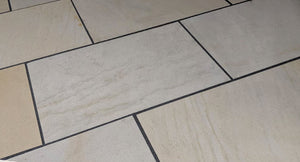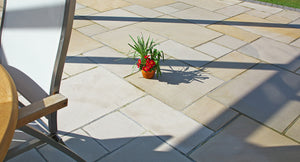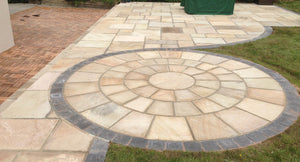
Yellow Mint (Whitby) Sawn Indian Sandstone - 900 x 600
£48.00 M² Inc VAT
Fossil Mint (Whitby) Sawn Indian Sandstone
£48.00 M² Inc VATFossil Mint Indian sandstone
What is Fossil Mint Indian sandstone?
Fossil Mint is a type of Indian sandstone, which has been long established as the UK’s favourite type of natural stone paving. Sometimes known as Whitby or Desert Sand, Fossil Mint is regarded as a premium colour in India. This type of Indian sandstone is famously light in complexion, but contrary to what you might expect from the name alone, the pale green makes up just one aspect of Fossil Mint’s distinctive shade. It also incorporates tones of cream, gold, yellow, orange, and light rusty hues. One of the most highly distinguishing features of Fossil Mint Indian sandstone is the beautiful fossilised markings that often run through the slabs, allowing you to add brightness, clarity, and a particularly intriguing visual touch to your outdoor space.
Should you seal Fossil Mint sandstone?
Yes. You’ll probably hear differing opinions on this particular question, but that’s certainly what we’d recommend here at Bridge Street Stone if you want to preserve Fossil Mint’s beautiful shade. While all Indian sandstone slabs will weather naturally under the elements to a certain degree, sealing Fossil Mint Indian Sandstone ensures that the colour doesn’t fade excessively. In fact, we’d recommend doing the same for all Indian paving stones, largely because they’re porous by nature. This means their surface can be easily penetrated by moisture, so they can be stained or marked by liquid. We personally recommend HG Impregnator as a standard treatment, or Nexus Colour Enhancing Sealer - both of which are highly effective measures against dirt or grease stains. If you ever need any specific advice or assistance on this topic (or anything else), we’re happy to help here at Bridge Street Stone!
Is Fossil Mint Indian sandstone good for paving?
Absolutely. Its intriguing blend of warm and cool colours combines with that distinctive fossil detailing to give Fossil Mint Indian sandstone a truly unique appearance. In case you’re wondering the fossilised markings are actually mineral deposits, and work to give a sense of individuality to each slab, resulting in a classy final effect that’s perfect for adding character to your garden or landscape. The Fossil Mint Indian Sandstone slabs are also highly practical additions to your outdoor space, and the hard composition flags we stock here at Bridge Street Stone have been specially selected to withstand the harsher elements of UK weather.
Pros and cons of Fossil Mint Indian sandstone:
Fossil Mint Indian sandstone offers a great range of benefits to your garden, which it shares with other types of Indian Sandstone such as Autumn Brown and Golden Leaf. Its distinctive appearance is one of its foremost draws for buyers, and happily it has very few drawbacks.
- It’s durable and long lasting, which means that as long as it’s properly sealed, you can rely on it to withstand even the harshest of weather - everything from rain, frost, storms or snow, all while adding value to your property over its lifetime.
- Its unique appearance, with its blend of warm and cool colours, complemented by its characteristic fossilised markings.
- It can be arranged into a wide variety of patterns and designs, which gives you the freedom to match it to the look of your property, or get creative to produce an individual and unrivalled appearance for your space.
- It’s very easy to maintain, so provided it’s been properly sealed, you should have very little difficulty in removing dirt and grime.
- It’s eco friendly, since there are fewer damaging chemicals used in the manufacturing process compared to some other types of paving stones. What’s more, it can be recycled at the end of its useful lifespan.
- It’s affordable and widely available, so you can always be assured of getting great value.
Cons
- It’s porous, so it can be potentially vulnerable to stains and marks from liquids, bacteria or mould. But if the sandstone has been properly sealed, you shouldn’t have to worry about these dangers.
- It’s naturally rough. Since Indian sandstone is 100% natural, certain types can be a little bit rough on bare feet. Worth knowing if you have any young children in the house!
- It can be marked. Indian sandstone is a relatively soft type of sandstone, so it can be vulnerable to hard or sudden impacts, like patio furniture being dragged across it or dropped from a height. However, as long as you’re careful when moving heavy objects onto or across it, you shouldn’t have to worry about much else. On the whole, it’s a very resilient type of sandstone!




